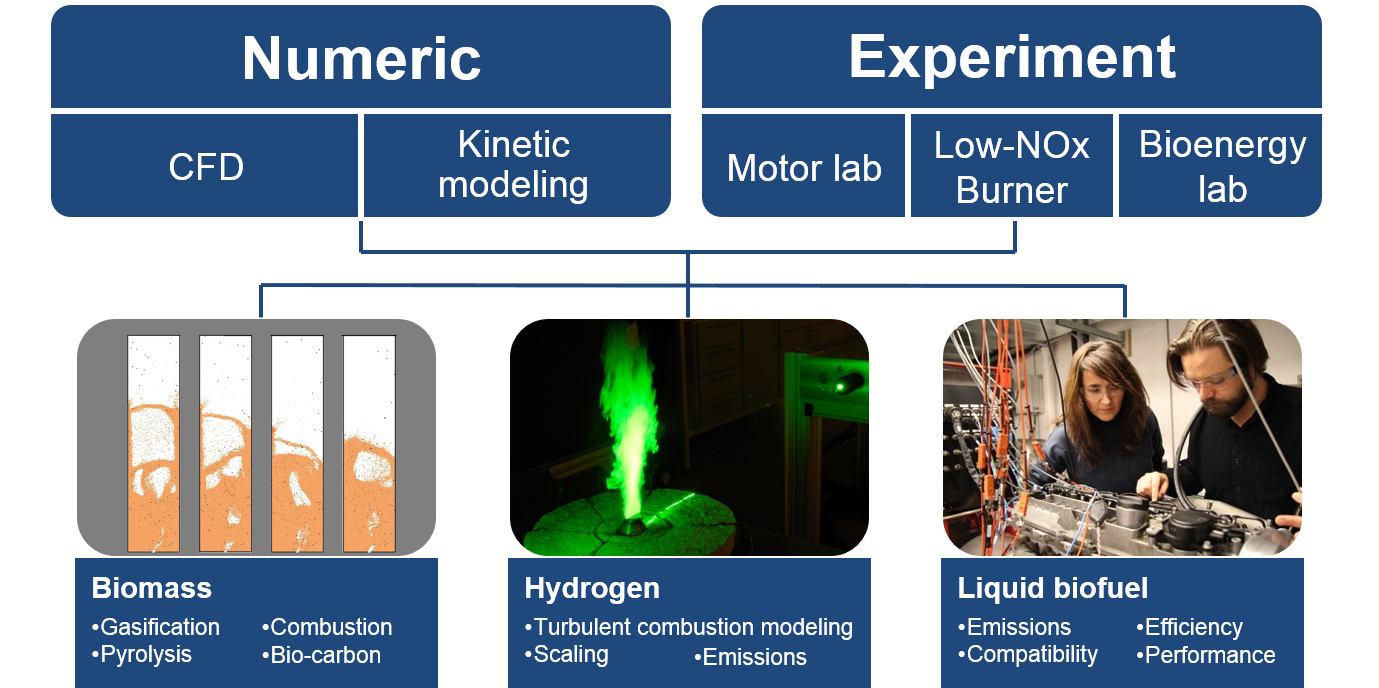Research - ComKin
Research activities
The ComKin group works on both numerical and experimental aspects of combustion science, with special emphasis on renewable and sustainable energy solutions. Recently, much focus has been on efficient and clean use of bio-fuels both for power production and in transport.

Ongoing projects and research networks:
Concepts of ammonia/hydrogen engines for marine application (CAHEMA). Funded by Nordic Energy Research and industry. Project partners: Lund University, World Maritime University and Aalto University. 2021-2023.
Ammonia Zero Emission (AMAZE). An innovation project funded by Norwegian Research Council and industry. Project partners: Bergen Engine, Sintef Ocean, Rise Fire Research, Equinor and Vår Energi. 2021-2024.
LowEmission center. Funded by industry partners and the Norwegian Research Council. 2019-2026.
Hydrogeni, funded by the Research Council of Norway and partners, 2022-2030
HiEffects, funded by Nordic Energy Research
HighRec - High-Temperature Gasification for Material Recycling of Municipal Plastic Wastes, funded by the Research Council of Norway, 2024 - 2028
Finished projects:
Ammonia as carbon free fuel for internal combustion engine driven agricultural vehicle (ACTIVATE). A Pol-Nor project in a consortium with Silesian University of Technology, Norwegian University of Science and Technology, University of Agriculture in Krakow together with industrial partner LOGE Polska Sp. z o.o. 2020-2023
Norwegian Centre for Sustainable Bio-based Fuels and Energy (Bio4Fuels). Co-funded by the Research Council of Norway and industrial partners (click here to go to the project website), 2017-2024
Nanomaterial Photo Ignition of Carbon Free Fuels in Marine Engines (NanoIgnite). A Radical frontier Researcher Project funded by the Norwegian Research Council. Project partner, Sintef Energi. 2021-2022.
BioCarbup. A competence project funded by the Norwegian Research Council and industry partners. 2019-2022.
Enabling optimum Grate fired woody biomass and waste to energy plant operation through Computational Fluid Dynamics (GrateCFD). Co-funded by the Research Council of Norway and industrial partners (click here to go to the project website), 2017-2021
Gasification for Biofuel Production (GASPRO). Funded by the Norwegian Research Council and industrial partners, 2017-2021
Combustion of hydrogen in CO2 capture technologies (HYCAP). Funded by the Norwegian Research Council, 2014-2018
Gasification for biofuels (GAFT). Co-funded by the Norwegian Research Council and industrial partners (click here to go to the project website), 2015-2019
Enabling the biocarbon value chain for energy (BioCarb+). Co-funded by the Norwegian Research Council and industrial partners (click here to go to the project website), 2013-2017
ElectNH3- Novel method for utilizing ammonia in an internal combustion engine- part of an NTNU Discovery pre-project (6 months).
Smart fuels - photochemical ignition control. Funded by the Research Council of Norway, 2016-2017
The Center for Bio-oil (C3BO). Co-investigator, joint with Aalborg University (Host), Aarhus University and various industry (Scania, MAN BW and others) (click here to go to the project website), 2014-2017
Investigation of Homogenous Charge Compression Ignition in an innovative barrel engine (RangeEx). Funded by EEA's Norway-Poland grants. (click here to go to the project website) , 2014-2017
Bioenergy Innovation Centre (CenBio). Co-funded by the Norwegian Research Council and industrial partners (click here to go to the project website), 2009-2017
International CCS Research Centre (BIGCCS). Co-funded by the Norwegian Research Council and industrial partners (click here to go to the project website), 2009-2016
Production of second-generation bio-fuel and its influence on engine combustion and emissions (BioEng). Co-funded by the Nordic Energy Research and industrial partners (Top-level Research Initiative), 2010-2013
Gasification for Biofuels (GasBio). Co-funded by the Norwegian Research Council and industrial partners (click here to go to the project website), 2010-2014
